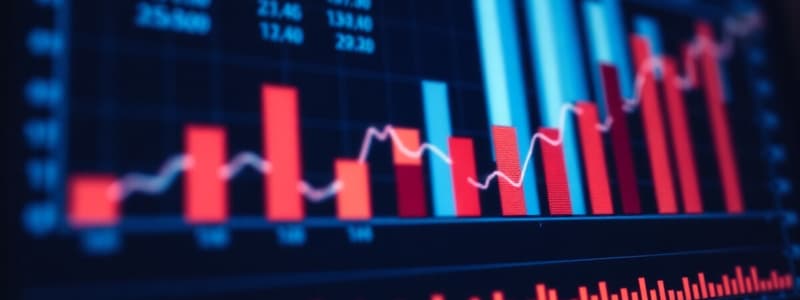Podcast
Questions and Answers
Why is statistics included in economics?
Why is statistics included in economics?
Statistics provides the tools and techniques to quantify and analyze economic activities and behaviors.
What is the definition of statistics?
What is the definition of statistics?
Statistics is the science of collecting, analyzing, and interpreting quantitative data.
Who defined economics as 'the study of mankind in the ordinary business of life'?
Who defined economics as 'the study of mankind in the ordinary business of life'?
Alfred Marshall
What is one example of statistics?
What is one example of statistics?
Not all numerical information qualifies as statistics.
Not all numerical information qualifies as statistics.
What is one key feature of statistics in its plural sense?
What is one key feature of statistics in its plural sense?
Which of the following best describes statistics?
Which of the following best describes statistics?
Qualitative descriptions are considered statistics.
Qualitative descriptions are considered statistics.
Which definition pertains to statistics according to Bowley?
Which definition pertains to statistics according to Bowley?
Statistics should be reasonably ____ to be reliable.
Statistics should be reasonably ____ to be reliable.
Flashcards are hidden until you start studying
Study Notes
Why Statistics in Economics?
- Statistics are crucial in economics because they provide quantifiable data to analyze economic actions and behaviors.
- Through statistics, researchers can: quantify, analyze, and interpret economic data, leading to informed decision-making.
What is Statistics?
- Science of data: Statistics is the discipline of collecting, analyzing, and interpreting quantitative data.
- Numerical insights: It uses numbers to provide insights, supporting decisions.
Definitions of Economics
- Alfred Marshall: Economics is the study of human behavior in everyday life.
- Lionel Robbins: Economics examines human behavior as a relationship between limited resources and unlimited needs with alternative uses.
Statistics as Numerical Data
- Plural Sense: Statistics refer to information presented in numerical form, for example, poverty statistics, employment statistics, or population statistics.
- Data Examples: Data sets like unemployment rates, average income levels, and population growth rates all are examples of statistics.
Statistics vs. Numerical Information
- Non-Statistical Numerical Information: Individual data points without aggregation or analysis do not constitute statistics.
- Statistics vs. Single Data Point: For example, saying "Ayesha has $500 left in her wallet" is just a numerical fact, but "The average amount left in an individual's wallet is $500" is a statistic because it represents an aggregate measure.
Definitions of Statistics (Plural Sense)
- Bowley: Statistics are numerical statements of facts pertaining to any area of inquiry. They present facts in relation to each other for better understanding.
- Kendall and Yule: Statistics are quantitative data influenced by multiple causes, highlighting the complexity of various factors affecting the subject of inquiry.
Features of Statistics (Plural Sense)
- Aggregate of Facts: Single numbers are not statistics, as meaningful conclusions cannot be drawn from them. Statistics are aggregates of facts, providing a basis for analysis.
- Numerically Expressed: Statistics must be expressed in numbers. Qualitative descriptions like "small," "big," "poor," or "rich" are not statistics.
- Multiplicity of Causes: Statistics are influenced by multiple factors. Even if one factor is removed, the remaining factors maintain the data’s meaning due to their complexity.
- Reasonably Accurate: Statistics should be reasonably accurate to be reliable, ensuring informed decision-making.
- Mutually Related and Comparable: Statistical data must be related and comparable for effective analysis and interpretation.
- Pre-Determined Objective: Statistics are collected with a specific purpose, ensuring that the information gathered is relevant and answers the intended questions.
Studying That Suits You
Use AI to generate personalized quizzes and flashcards to suit your learning preferences.




